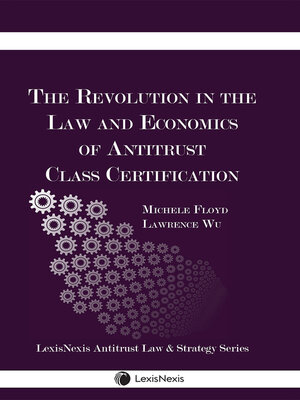
Sign up to save your library
With an OverDrive account, you can save your favorite libraries for at-a-glance information about availability. Find out more about OverDrive accounts.
Find this title in Libby, the library reading app by OverDrive.



Search for a digital library with this title
Title found at these libraries:
| Library Name | Distance |
|---|---|
| Loading... |
After decades of stagnation, there has been a rapid and dramatic change in the way courts are reviewing and deciding antitrust class actions. The applicable standards have changed. Along with that, there has been a change in the way judges, lawyers, and economists think about the issues surrounding the certification of antitrust classes. These developments have changed the arguments made as well as the types of evidence presented in court. The result can change who wins and who loses, which raises practical and pressing issues for all involved ...
There has been a revolution in the way courts approach antitrust class certification. Courts now demand more rigorous evidence from both plaintiffs and defendants at the class certification stage...The Revolution in the Law and Economics of Antitrust Class Certification offers guidance on this aspect of class certification, as it relates to antitrust, through an examination of a handful of antitrust cases that have proven instrumental in re-shaping the law. It provides the general analyses involved in determining whether a class can be certified, where the determination of who is appropriately included in the class of those who have been harmed can turn an ordinary claim for damages into a multi-million dollar, bet-the-company litigation, and where, on the other hand, an unsuccessful motion often ends the litigation.
Revolution in the Law and Economics explores why antitrust law is so important in today's economy; why antitrust class action lawsuits are brought; how they are decided, and the legal and economic issues that have changed the way the courts approach them; why and how economic analysis has become an essential part of antitrust law; and how antitrust law has changed as a result of the analyses and evidence that economists have brought to the courtroom.
Revolution in the Law and Economics looks at the underlying legal and economic concepts and principles underlying these decisions, both tried and true, and tried and failed. This book is a discussion, and it is intentionally directed toward a broad audience: practicing attorneys who want to know how and why antitrust class actions are litigated very differently today than they were for decades; general counsel and in-house attorneys who want to know what their case will look like if they are sued; judges who are looking for a brief on how antitrust class action law has changed over the past decades; executives and policymakers who may be concerned about the business and public policy implications of class actions; executives and policymakers in Europe and other countries who are considering enacting class action laws; economists who want to know how their economic theories and empirical techniques are having an impact on decisions in the courtroom; and anyone who gets a settlement check or a notice of an antitrust class action who wonders what happened before the check was cut. Revolution in the Law... serves as a lesson in history and an examination of the way change takes place in the courts. It looks at the trends that precipitated the change and the rapid rate of change once one judge spoke up.







